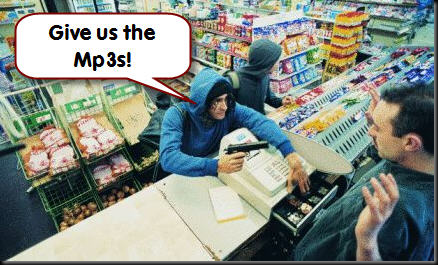What is theft, really? From my perspective, theft is removing an item from a person or organization without their consent. It does not necessarily dictate that the thief keep that item, or what happens to it after it has left the protection of the original owner.
Why am I trying to define this term? I am trying to figure out why it seems many people object to stealing software, and why others seem to think it is okay. I am also trying to figure out which side I am on (although my natural instinct is to justify my past actions by saying it’s okay). At the moment, I am thinking that it’s the business model and economics of software that eventually need to change, and not the morals of all the download-happy, wAreZ surfing, iso-kiddies.
Analyzing a few scenarios

So what happens when an item gets stolen in the real world? Well one person physically removes that item from the store or person, and then either keeps it for themselves, or sells it. The person who originally either created or bought that item, now doesn’t have it. That original owner has lost some quality of life simply because another person decided they wanted it.
In contrast, what happens when a piece of software gets “stolen”? Digitally, each bit is accessed and copied from one medium to another, creating an exact duplicate. That duplicate is then usually made accessible to the internet, which then allows other computers to access and copy each bit for the purpose of storage on their own machines.
In the first case (“real world” stealing) – after the “act” is carried out, there is still one item in existence. That item is now in the hands of the thief and not the rightful owner. In the second case, there are now a total of 3 copies. One, still unchanged, in the owner’s possession, one in the “thief’s” hands, and one for the person who downloaded from the internet.
Copying software in this way doesn’t harm the original person’s quality of life. In the case that the original owner created that item, it will cause them to have a harder time selling it if the copies start getting widespread visibility.

Motivation
Getting paid is clearly the main problem people have with copying. The copier doesn’t (usually) pay the creator for that software. Yet, the creator obviously spent many hours out of their life creating it. They deserve some sort of compensation for their contribution to mankind. If this person got no compensation for the work he/she did, there would be no real motivation to do it. It would make more economic sense to work at a company and get paid a steady salary.
I will assume that last paragraph’s statement is agreed upon because anyone against it would be proposing that we start being communists. We need money to motivate us in a capitalist society!
Without the creator making the software/music/video/etc for the masses, nobody would be able to copy and enjoy it. However, copying is so easy in this digital age, that I believe it is unreasonable to simply expect people to just not copy this stuff.
“Real World” Analogy
What is the “Real World” analogy to software piracy? I think it would be like someone inventing an “Atom Copying” machine. If someone could go into a store, scan a product, and then leave with an exact replica of that item, it would be comparable. Now keep in mind, that each scan costs the user some small price, but they don’t pay the creator this price. Obviously the store keepers would start getting angry that people keep walking into their store, scanning items, and walking away with a copy!
Are laws really the best solution, though? If this “atom-copier” happened, I think we might need to re-think commerce. If we can copy anything, couldn’t we then copy things like food, and then ship it to 3rd world countries? We could copy the dollar bills in our pockets to make more money! The whole economy would collapse! I suppose the new form of currency would be the raw materials the machine needed to create these things.
Although software hasn’t caused the whole world economy to collapse, it certainly seems to have shaken up the music/movie industry. They have relied upon the fact that people can’t get their hands on unlimited listening of their music or watching of their movies without paying them. I think this is a shaky assumption – and has clearly been broken down by the invention of bit torrent.
What to Do?
So what do we do about the current situation? The people who get media from the creators would like for them to make money. They just don’t want to (or can’t) pay them themselves. My current thinking is that we need to start creating things that cannot be copied. We need to create value for people that they can’t do for free (like copying bits). Now that we cannot charge for copying bits, we need to think of another way to create that value. The fact that copying bits is so easy sets off a signal in my brain that it no longer has monetary value. It’s the “idea” that counts in this case. Obviously, I am getting at “intellectual property” now, but I am not sure it should work the same way it does currently.
Should there be some sort of government setup for people creating ideas? Sounds like a law to me. I really would like to avoid arbitrary laws to keep society functioning – it always seems to fight the natural flow of humanity and eventually becomes more hassle than it’s worth.
Maybe we just need to set up web services that force the user to pay. Just simply arranging 1’s and 0’s in a particular order is not really enough to make money. If we have a web-based application, we can require a log-in, and then most of the code is on the server anyway – so there is no way that anyone can copy that asset. The downside to this is forcing a hosting fee for your entire user-base. That sucks! Now you have an O(N) cost complexity just because you don’t want people stealing your software!
However, if you think about it, regular products have an O(N) complexity for their users as well. They need to physically produce each product they create and then physically ship each of those items to the proper location to be sold. The lack of this process is partially why we like software, but for now it might be required to enforce morals on the seething masses.
So anyway, I have thoroughly confused myself about the subject, so I would like some feedback if anyone is so inclined. What do you think we could do to take advantage of our awesome technology of file-sharing, while also paying the developers that make awesome software?

